How football helped transform Dwayne Johnson into Hollywood's biggest star

This story appears in the Dec. 5, 2016, issue of Sports Illustrated. Subscribe to the magazine here.
To understand how Dwayne Johnson has become the biggest star in Hollywood, it is necessary to first visit the teachers' lounge at Freedom High in Bethlehem, Pa. Actually, start in the malodorous boys' bathroom. Johnson had landed in Bethlehem after years of turmoil. His family lived on the margins, dogged by eviction notices; Freedom was his fourth high school in three years, in three states. At every stop he became a regular in the principal's office. Johnson was big and mean, and since his father and grandfather were professional wrestlers, other kids were eager to test him. Johnson obliged with his fists. Throw in some scrapes with the law as a youngster in Hawaii, and Johnson had a well-developed problem with authority. So in his second week at Freedom, when he didn't like the smell of the boys' bathroom, he nonchalantly strolled through the teachers' lounge to the attached restroom. He was at a urinal when a short, barrel-chested, mustachioed gent stormed in and informed him he was in the wrong place. Johnson paid no mind and took his sweet time washing his hands, at which point the teacher pounded on the wall and bellowed, "You need to get the f--- out of here!"
Johnson brushed past him without so much as a word. And yet something about the encounter registered; the fierceness of the man's voice reminded Johnson of his Samoan elders, the kind who, he says, "would beat your ass if you didn't show the proper respect." Johnson asked around to get the teacher's name—Jody Cwik—and sought him out. "I apologized for being such a punk," Johnson says, laughing at the memory. "I didn't want to be that kid. He shook my hand and wouldn't let go. Crushing handshake. And he looked in my eyes and said, 'Son, I want you to come out and play football for me.' That was the day everything changed."
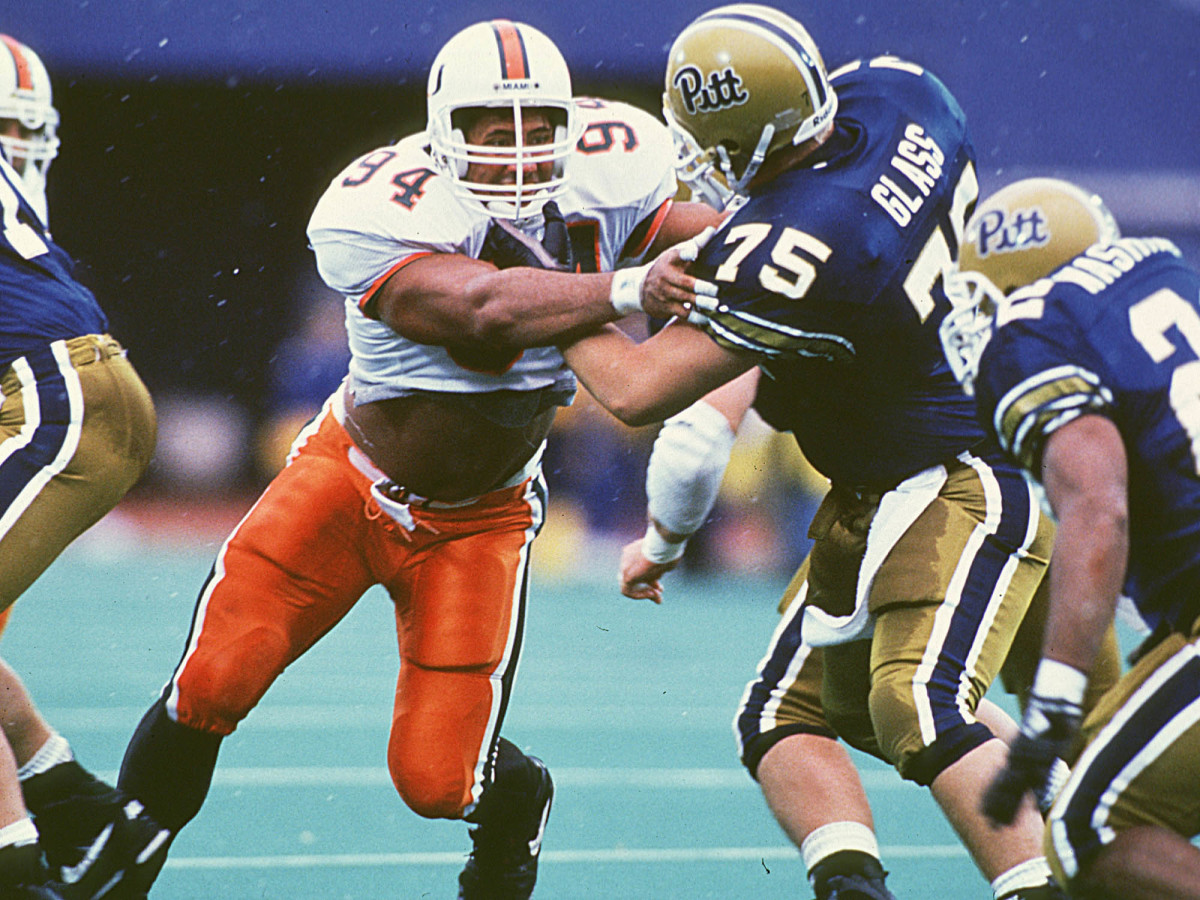
On the football field Johnson was given the structure and discipline his life otherwise lacked, and Cwik became the strong male figure young Dwayne needed since his father, Rocky, was usually away, barnstorming. Johnson had run with street toughs in Hawaii, where he lived as an early teen, but found in his Bethlehem teammates a more uplifting camaraderie. In addition to the wrestlers, Johnson's family tree has a handful of veterans, including a Navy SEAL. "I've got warrior blood, bro," he says, and as a 6'4", 230-pound junior he wreaked havoc from the defensive line and as a tight end who loved blowing up safeties. Johnson had dabbled in football at his previous high schools, but it was at Freedom that "I fell in love with the game," he says. "It was more than that, actually. It gave my life a purpose. Coach Cwik sat me down and said, 'Listen, your family doesn't have any money. Your grades are average. If you're going to get out of this town and make a different life for yourself, football is the vehicle.' He explained how I could get a scholarship, and that was a whole shift in my psychology. Suddenly I had a chance to become the first person in my family to go to college. I became obsessed with making it."
Johnson got offers from Penn State, UCLA, Clemson, Florida State and dozens of other top programs, but he hadn't heard from the one that had transcended the sport and become a cultural touchstone: the U. And so, befitting Miami's renegade image, Johnson cold-called the school's recruiting coordinator and made his sales pitch. The next day head coach Dennis Erickson was in touch, and Johnson eventually accepted a full ride. He arrived on campus in the fall of 1990, to a team stacked with blue-chip recruits and future pros. Johnson reveled in the Hurricanes' brash culture. "Oh, man, the s--- talking was an art form," he says. "It never stopped, and it was creative. It helped me when I got into wrestling, right, tapping into all of that for the Rock."
Johnson made such a strong first impression that he was going to be the only true freshman on the team. "He had tremendous get-off, he was strong, he could use his hands, he was tough as nails, and he worked his ass off," says LSU head coach Ed Orgeron, who directed the defensive line at Miami from 1988 through '92. "Dewey was a helluva football player. I thought he had a chance to be an All-America."
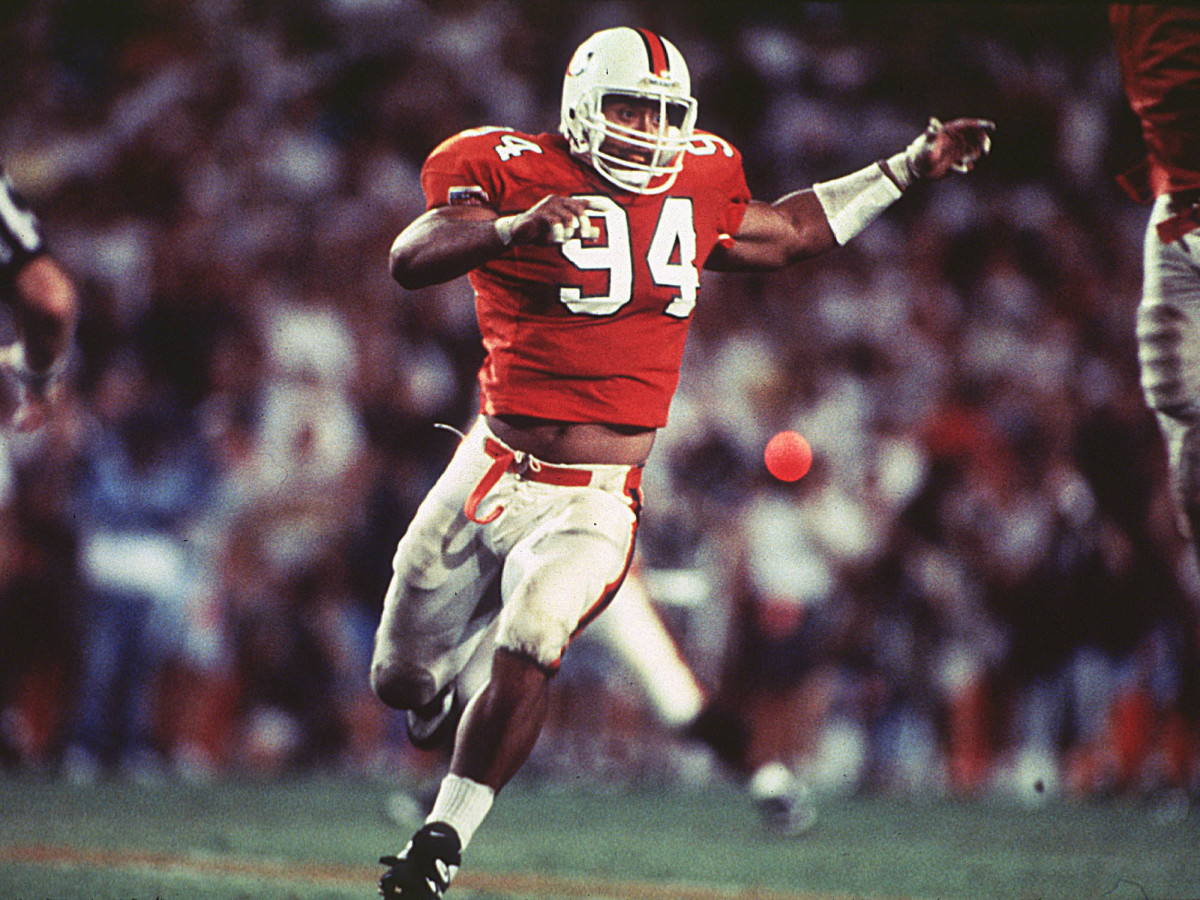
And then, on the final practice of two-a-days, Johnson shredded his left shoulder, necessitating surgery. To fill his spot, the coaches later converted a big, nimble tight end named Warren Sapp. Johnson would spend the rest of his college career in the shadow of the future Hall of Famer. Four knee surgeries further stunted his development. Yet Johnson looks back on the character-building he did at Miami as the foundation of all that has followed. "People saw the cockiness, but no one knows how hard we worked," he says. "There was an accountability there, and Coach Orgeron was a big part of that. In games it seemed as if those offensive linemen were holding us on every play. Coach didn't care. I complained one time, and he got in my face and said, 'They can hold you, they can kick you in the balls, they can f------ spit in your face—are you going to cry about it or are you going to overcome that and make the play?' That's bigger than football, man. That's a whole worldview."
Still, Johnson's frustration at not being an impact player boiled over one day after practice, when he was heckled by his friend and fellow linemate Kevin Patrick. "I was always running hot because I wasn't getting the playing time that I thought I deserved," says Johnson. "The truth of the matter is Warren Sapp was just a better player, but when you're young, you can't see that. Me and Kevin were in a coach's office, and he was talking s---, as always, but this time I just lost it. It was like a movie fight—the desk got turned over, stuff was flying all over the place. We spilled out onto the weight room floor, still going at it. He wouldn't stop talking, so I decided to pull his tongue out. I stuffed my big ol' hand into his mouth, and I had a couple of fingers around his tongue, but it was so damn slippery! I was quite serious about pulling it out, but I couldn't quite get a hold of it. Eventually I gave up, the fight ended, and two minutes later we were hugging each other. It was so dumb."
Johnson ended his Miami career with 78 tackles and four sacks. No NFL team deemed him worthy to draft, so he swallowed his pride and signed with the Calgary Stampeders of the Canadian Football League before the 1995 season. Two months later he was cut, a wrenching end to his football career. Johnson headed to Tampa to live with his parents. Along the way he took an accounting of his life and realized that all he had to his name were the seven dollars in his wallet.
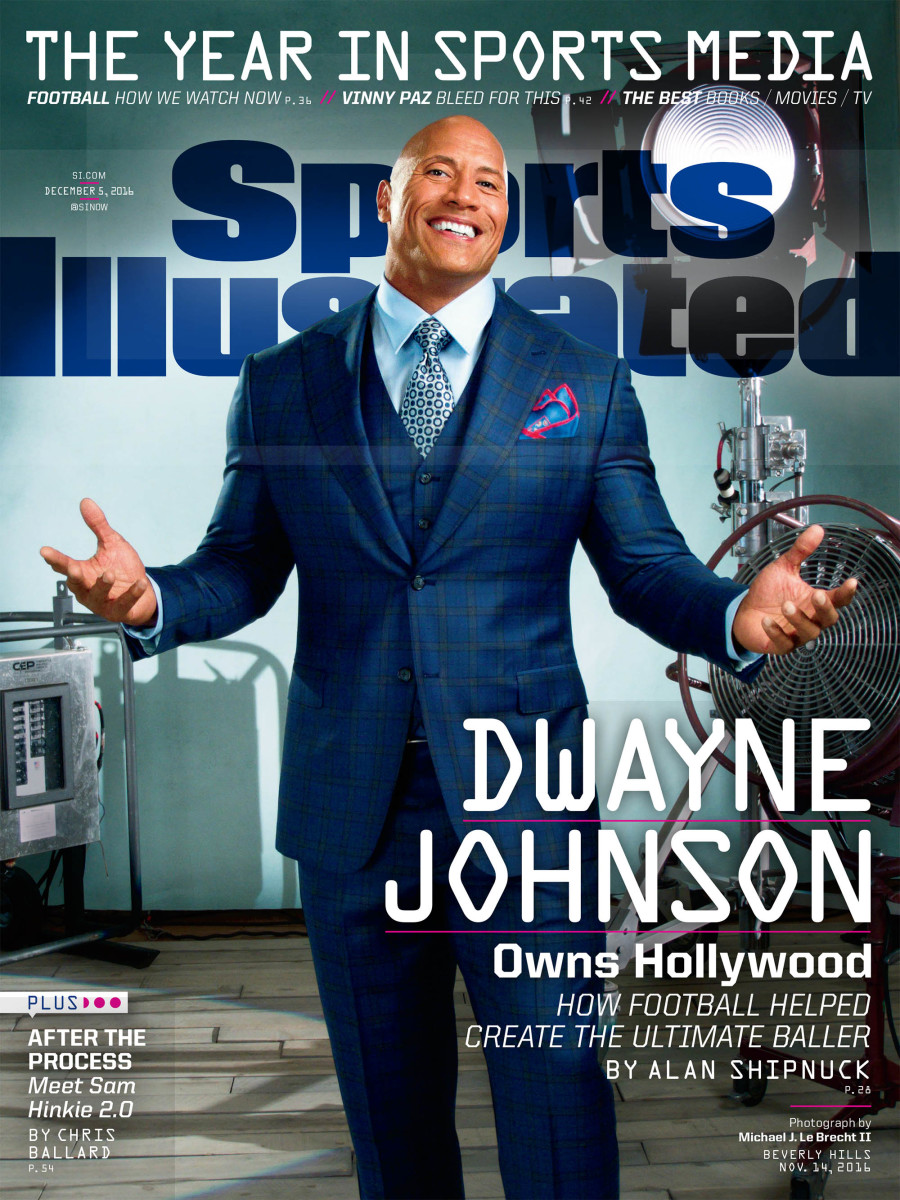
- Coming soon: More behind-the-scenes content from Dwayne Johnson's SI cover shoot.
In August, three months before People declared Johnson to be the Sexiest Man Alive, Forbes named him the highest paid actor in Hollywood, with an expected haul of $64.5 million for 2016. That pile of money includes fees for appearing in Baywatch and Fast 8, both of which will be released next spring. There are also various revenue streams from his company, Seven Bucks Productions, through which Johnson is reinventing himself (yet again) as a multigenre Hollywood mogul. Seven Bucks has producing credits on several projects, including Rock and a Hard Place, Johnson's affecting documentary about kids swallowed up by the criminal justice system, and the Entourage-meets-the-NFL show Ballers, which is currently HBO's highest-rated half-hour offering, outshining critical darlings Veep and Silicon Valley. On Dec. 13, Spike will air another Seven Bucks production, Rock the Troops, a two-hour special in which Johnson, channeling Bob Hope, hosts a variety show that was filmed before a live audience of 45,000 servicemen and servicewomen and their families at Pearl Harbor. Johnson displays his surprising singing chops in the recently released Disney movie Moana, but no one was prepared for him to hit the stage at Rock the Troops in a bejeweled white pantsuit and croon his way through "Heartbreak Hotel." Says Kevin Kay, president of Spike, "He started shimmying his hips and doing the full Elvis, and all of us were standing there like, Wow, what can't this guy do?"
Over the last two years Johnson's films have done more than $2.2 billion in worldwide box office, and there is no letup in sight for what Johnson calls his plan for "benevolent world domination," as he has six more tentpole movies in various stages of development. "Dwayne is now everyone's first choice for any big role," says Toby Emmerich, president and COO of New Line Cinema and an executive producer of this year's Central Intelligence, a spy caper in which Johnson sprays bullets and one-liners with equal aplomb alongside his little buddy Kevin Hart. "Maybe once in a generation you get a performer with this kind of versatility and range and likability. It's rarified air. And for him to have come from a sports background? The odds of that happening are one in a hundred million. Every athlete in every sport wants to try to be an actor, but how many make it?"
Indeed, from Johnny Weissmuller to Jim Brown to O.J. Simpson to Michael Strahan to LeBron James, jocks have always been seduced by the bright lights of Hollywood, but only a former Mr. Universe, Arnold Schwarzenegger, has succeeded on a scale similar to Johnson's. While all those others leveraged their athletic success, Johnson was fueled by his failure. After washing out of football, he went through what he calls a "nice fun dance with depression." He adds, "I'd always had a very specific vision of my future. I was going to be Michael Strahan: I would win a Super Bowl with the Giants. I'd have the beautiful wife, the big house ... strangely, that house was in New Jersey. I think about it all the time: What if I had been a little better at football? Maybe I would've had that success and become complacent. But I didn't get to walk away [from football] on my terms, and that lit a fire that still burns. I wanted that life I had envisioned, but I had to find another way."
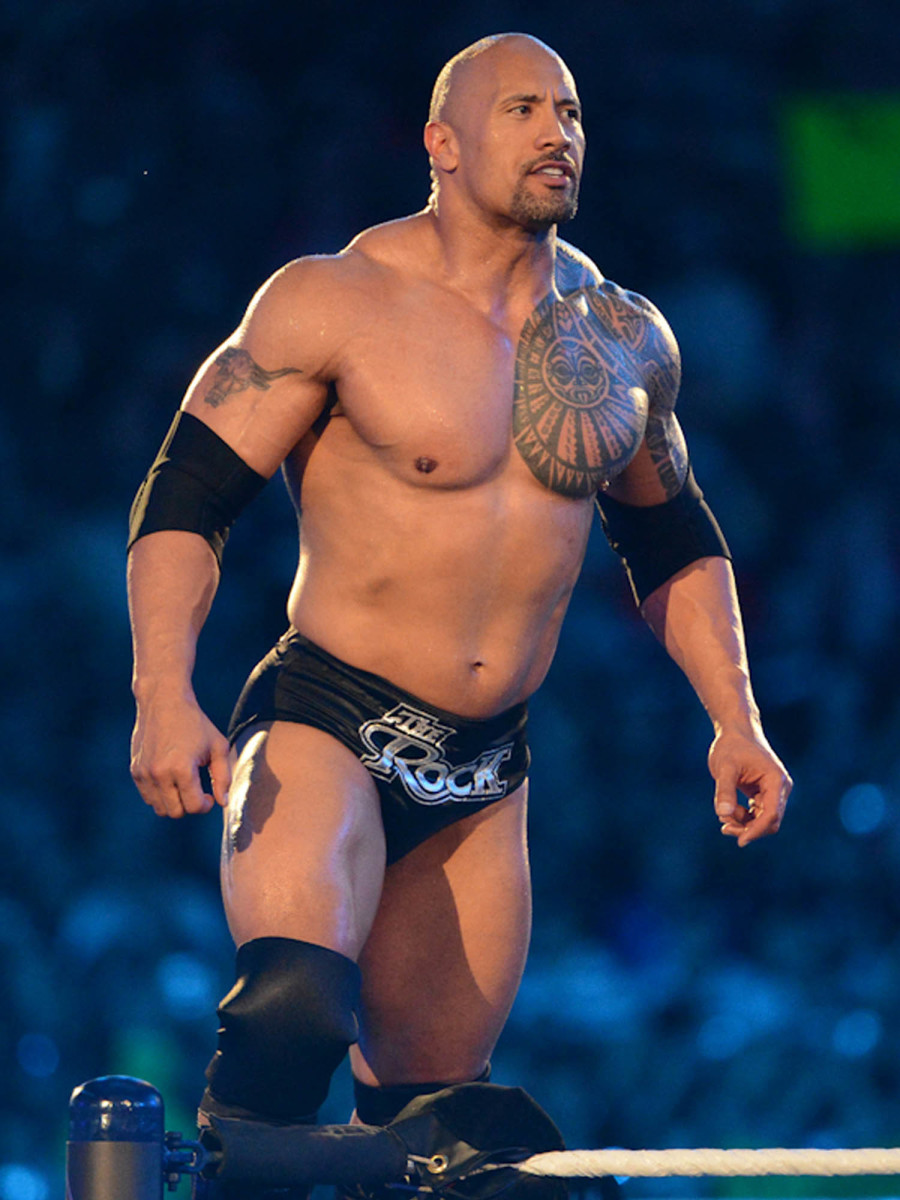
So he returned to the family business, creating the role of a lifetime. Johnson joined the then World Wrestling Federation in 1996 and soon turned himself into the Rock, a charismatic antihero with the shredded physique of a defensive lineman. He didn't know it then, but he was already preparing himself for Hollywood. "I've always been a performer," he says. "When I was eight years old, I used to crack up my family by doing Richard Pryor monologues. So the showmanship of wrestling came easy to me. I loved playing the heel because of the intense reaction it generated. That was my No. 1 thing every night: I just wanted to connect with the audience."
By the turn of the century the Rock was a phenomenon, and Johnson was dabbling in TV with cameos on That '70s Show and Star Trek: Voyager. In 2001 he made his silver screen debut in The Mummy Returns, a so-so action sequel that did a surprising $202 million in domestic box office. The next year he was rewarded with star billing in the spinoff, The Scorpion King. "That was a wake-up call for Hollywood," says Dany Garcia, Johnson's careerlong business manager and the cofounder of Seven Bucks. It is a thoroughly modern arrangement: She's his ex-wife, and they share custody of their 15-year-old daughter, Simone; two years ago Garcia married Johnson's former trainer Dave Rienzi. "As he was trying to transcend wrestling," Garcia adds, "people in this town didn't really know what to make of Dwayne, but from the beginning it was very obvious that his very large, very loyal fan base was going to follow him on this new journey."
Dwayne Johnson named People's Sexiest Man Alive
Over the next decade Johnson appeared in more than a dozen other movies, displaying a soft side to go with his bulging biceps. In a profession full of narcissists and misanthropes he developed a reputation as a dream on set. "Dwayne loves to be coached. It's part of his vernacular coming from football," says veteran producer Beau Flynn, who produced last year's San Andreas, which grossed $474 million worldwide. "He understands a team philosophy. On these big action movies the daily spend rate is incredible, so you need your star to come through when it's his turn. I love to get Dwayne fired up before a big scene. You can see the intensity and excitement build inside of him, and that moment is probably no different than what he was like running out onto the field for the University of Miami."
For all the success Johnson was enjoying, he was in danger of being pigeonholed in smash-'em-up action movies until Ballers came along. It is set in South Beach and has all the attendant glitz, but Johnson provides the show's heartbeat as the Strahanian character, Spencer Strasmore, a Super Bowl--winning linebacker who is struggling to find his footing in life after football. Actual NFL logos help the look of the show, and cameos by real players pump up the star power, but Johnson's biography gives Ballers much of its verisimilitude: Strasmore was a high school star in Bethlehem, Pa., and in the pilot episode he gives an emotional monologue lamenting the unceremonious end to his professional career. "My own experiences in football, and in life, have informed every word out of my mouth on that show. It's so real," he says. "I was drawn to the material because we put these players on a pedestal, but the fans never get to see the struggle. It's all here—the highs and the excitement of that life, but also the messiness." Ballers established Johnson's versatility as a producer and actor, but more personally, it has helped bring closure to the only part of his life that hasn't been a rousing success. "To show you how much football affected me," he says, "for years I would have these dreams where I was playing in the Super Bowl. I'm the star player, and everyone in the stadium is waiting for me, and I walk out of the tunnel and I don't have my f------ cleats on. Or I can't find my shoulder pads. It started to get weird, like sometimes I would run out of the tunnel, and my uniform fit like a diaper. I couldn't shake it."
The dreams stopped only a few years ago, after Johnson had arrived as a movie star. That's why being minted as the world's highest paid actor was meaningful; in Hollywood, money is how they keep score. Johnson's celebrity can be quantified in other ways: His YouTube channel reached a million subscribers in less than a week, and across Twitter and Instagram he has more than 81 million followers; his Facebook page has received more than 57 million likes. On social media he is affable and self-deprecating while constantly interacting with fans, often taking them behind the scenes of his movie sets or into the gym, where he still trains six days a week as if he's competing with Warren Sapp for playing time. (Throw in a low-fun diet, and Johnson, 44, says he is in the best shape of his life, blessedly free from any football or wrestling dings.) Johnson's ability to mobilize his fan base is one of the reasons his movies consistently beat box office projections and why Under Armour signed him to a seven-year deal in 2015 that will give him his own line of footwear and apparel. Add to that the inspirational tone of his rhetoric, and there is already talk that this registered Republican may one day seek political office, a once-fanciful notion Johnson has come to embrace. "It's something I'm very serious about in the future," he says.
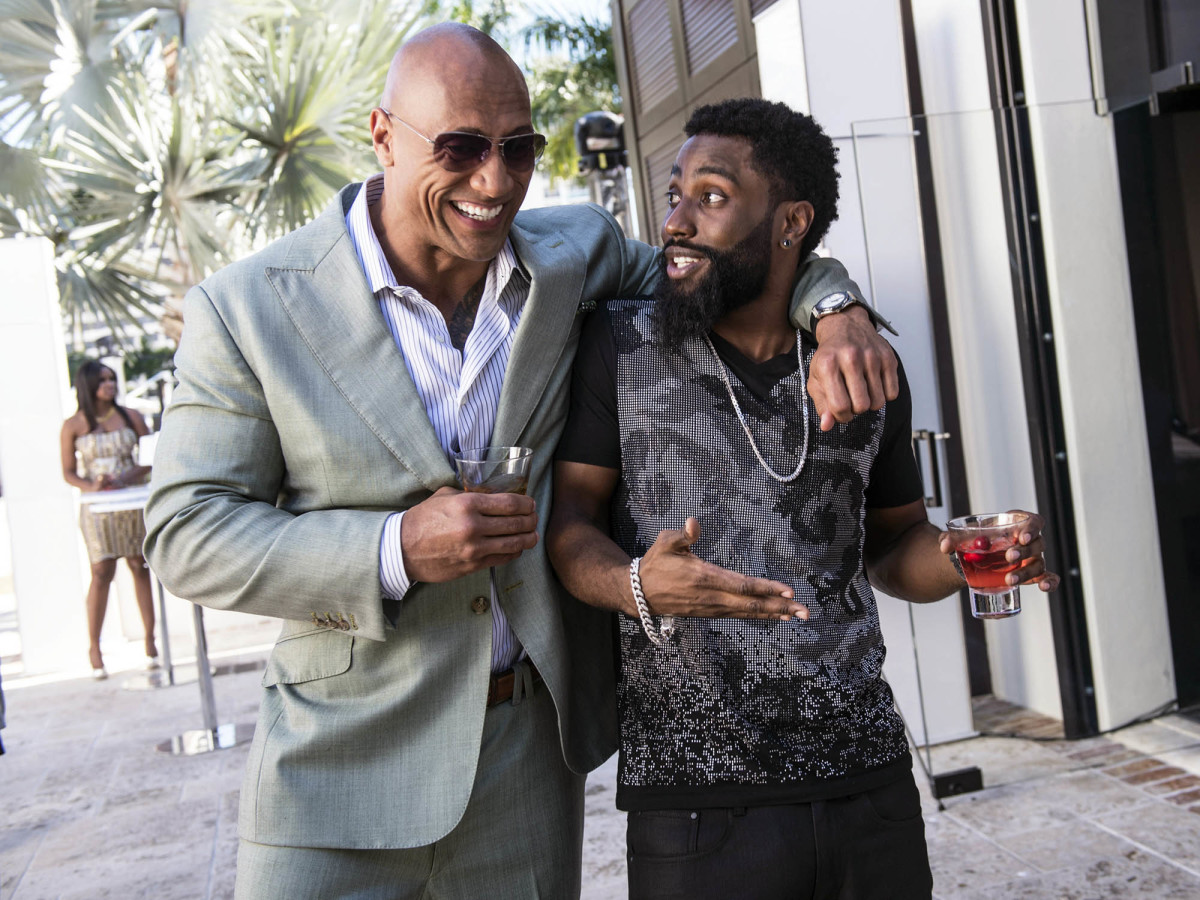
And so the life Johnson always wanted has become a reality, including the house (a 13,000-square-foot mansion in South Florida) and the girl (longtime companion Lauren Hashian, with whom he has a one-year-old daughter, Jasmine). A couple of years ago Johnson bumped into Strahan, who in retirement has done well for himself as a TV personality. He was floored when Johnson copped to having fantasized about being him. "Man, I'd gladly trade lives with him right now!" Strahan says. "O.K., he didn't quite have the football career he wanted, but most guys don't. And those who do pay a steep price physically. I think it's pretty clear Dwayne got the last laugh."
Johnson is a connoisseur of irony. On the subject of Strahan he invokes the actor Kurt Russell, who was a second baseman in the Angels' minor league system before a rotator cuff injury derailed his athletic dream. "So much of his drive comes from failing as a baseball player," Johnson says of his mentor. "He had one goal, to make it to the big leagues. We've had great philosophical conversations about how you make sense of your failures. And you know what the simple answer is? I was in the wrong game. And now I'm in the right one."
